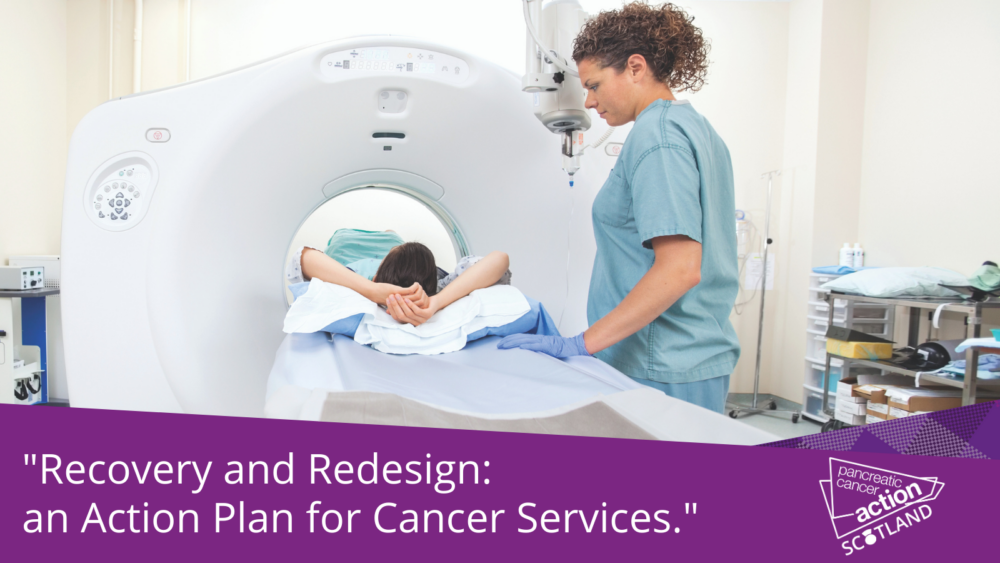Scottish Action Plan for Cancer Services
Following the recent release of the Scottish Government's cancer recovery plan, we explore how it intends to tackle a number of key issues surrounding cancer diagnosis and treatment, pancreatic cancer's inclusion in the plan, and how we'll be working with our partners to ensure that it fulfils its ambition.

On Wednesday 9th December, the Scottish Government published “Recovery and Redesign: an Action Plan for Cancer Services.”
The document outlines how the NHS in Scotland will continue to respond to the ongoing challenges of managing cancer care alongside Covid-19 and how services can be restored and redesigned to meet the ongoing and future demands posed by cancer.
Within the plan are a wide range of actions focusing on detection, diagnosis and treatment alongside patient and family support.
Pancreatic cancer in the plan
The references of pancreatic cancer in the plan and acknowledgement of the lack of progress in improving survival rates of the disease is very encouraging. We will continue to work with The Less Survival Cancers TaskForce, The Scottish Cancer Coalition and other partners to drive forward new ways of diagnosing pancreatic cancer early and treating the disease successfully.
Early diagnostic centres
We welcome the introduction of early diagnostic centres for cancers with vague and nonspecific symptoms like pancreatic and the progress towards ensuring that GPs can refer directly for CT scans for patients where cancer is suspected. Research has shown that similar models, used in other countries, often pick-up cases of pancreatic cancer. We look forward to engaging with health boards as these centres are established, to help increase health care professional confidence in referring alongside encouraging the public to present with symptoms.
Reducing inequalities
We were pleased to note the emphasis on reducing inequalities in the plan and the focus on less common cancers like pancreatic. We welcome the steps being taken to ensure that there is access to treatments regardless of whoever and wherever you are in the “Once for Scotland approach.” Alongside this we welcome the commitment to improving the diagnostic and treatment pathways for patients with suspected pancreatic cancer. We know that the longer the wait for a diagnosis or for the right treatment, the less treatment options are available for patients, so steps to reduce the amount of time patients spend in these pathways could help with early diagnosis and save lives.
A single point of contact
Furthermore, we were happy to read the Scottish Governments decision to introduce a single point of contact for patients along the diagnostic pathway. Being diagnosed with pancreatic cancer can often involve several tests and visits to health care professionals. Patients may need a wide range of support, from becoming as physically fit as possible for treatments, to emotional support or advice with weight loss or symptoms. We know that this can be a very anxious time and throw up a number of questions and concerns and we support the plans to have a single point of contact to ensure patients can receive the support that they need. We believe that this new position is vitally important and we will be exploring ways to ensure that those being investigated for pancreatic cancer are fully supported.
Pancreatic Cancer Action’s position
Overall, we believe that this plan offers some important ways of improving early diagnosis and outcomes for patients with pancreatic cancer, some of which could be beneficial across the UK. We are pleased to see an emphasis on the disease and other less survivable cancers and are looking forward to working with partners to ensure that the plan fulfils its ambition. We are keen to hear more about NHS Scotland’s plans in regard to delivering the workforce capacity to complement the work being done across the cancer sector and the rest of the NHS.
Fiona Brown Scottish Development Manager comments:
“We look forward to continued progress in recognising the need for change for pancreatic cancer patients and outcomes. We welcome the Scottish Governments commitment on reviewing pathways of specific cancers, in particular the reference that their “first priority will be to work with the Scottish HepatoPancreatoBiliary Network and support clinical consensus on redesign of pancreatic and liver cancer pathways”.
This builds on the foundations of work by many, especially Scottish campaigner Lynda Murray who has tenaciously engaged with politicians and clinicians to drive collaborative change for pancreatic cancer.
Although our health and economic landscape is facing many challenges in these unprecedented times with COVID-19, we can continue to embrace Scotland’s collaborative spirit by working with the pancreatic cancer community, The Scottish Government, The NHS, The Scottish Cancer Coalition and the wider third sector network. By ensuring patients and families have access to support, information and care, together we can make a big difference and by exploring and driving opportunities for change, together we can take action to ensure that the 2020’s is The Decade of Change for Pancreatic Cancer”.